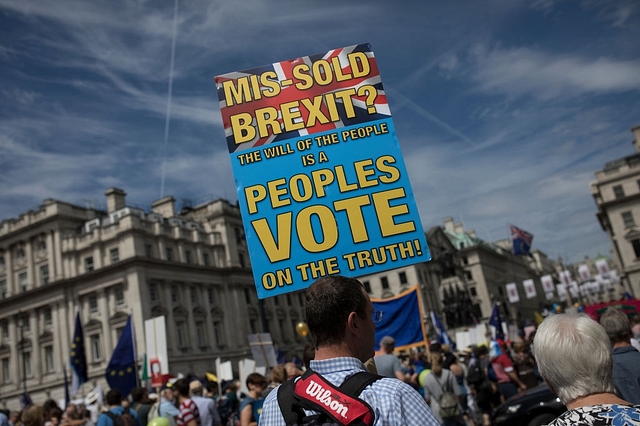
Brexit Vote Is Proof That Referendums Are The Worst Invention of Democracy
Referendums are actually less about democracy and more about making a complex choice binary – and self-defeating.
Brexit proves this.
The defeat of British Prime Minister Theresa May’s Brexit deal by Parliament, which is being followed by demands for a new referendum on Britain’s exit from the European Union (EU) to annul the last one in June 2016, proves one thing: referendums are a bad way to ask people to decide a complex issue like entry or exit from an economic union.
One should go further and ask whether referendums make any sense at all in any complex situation, including calls for a province’s demand for independence, when voters cannot fully comprehend issues. Even in economic issues, like demands for lower taxes or higher subsidies, voters may vote in favour of what suits them without counting the costs to the entire population.
Even in economic issues, when people vote on issues of taxation or subsidies, the results are often worse than expected. In 1978, California voted for proposition 13, a proposal to cut property taxes that was put to the vote in a referendum. The resultant cut in property taxes produced more negative outcomes than positive ones, and ruined the state’s fiscal situation, especially those of municipalities, with negative consequences for the quality of public services.
Put another way, referendums are a complete negation of the idea of representative democracy, where we elect MPs or MLAs to do their best they can in complex situations in our best overall interests.
For example, many of those who voted for Brexit voted so for different reasons: fear of immigrants swamping the UK, poor income growth in some depressed regions of the country, etc. Those who voted for remaining in the EU, may have voted because they saw better job prospects elsewhere in the EU, or because they lived in London, which has been the biggest beneficiary of the globalisation of the financial markets.
Those who voted to leave outnumbered those who wanted to stay, but neither knew what was best for the largest number of Britons.
People want free trade or free market deals when they can benefit from the positives, but they would prefer not to acknowledge the downsides. But any deal creates winners and losers, and in a referendum, far from optimising or reconciling the interests of both sides, one side will win temporarily at the cost of the other. And ultimately both may lose – as is the case with Brexit. Referendums always create suboptimal outcomes.
The fact that referendums can be held again and again on the same subject – Quebec voted twice on the independence issue (1980 and 1995), and Scotland has voted many times for greater devolution of power or even independence – shows that referendums can never be the end to any problem. If you lose once, you can always call for another referendum. Sentiment may carry the day, but those who vote based on the basis of emotion often don’t realise what they are losing in the bargain.
In India, the idea of a separate Muslim majority homeland in Pakistan was supported most strongly by Muslims in the United Provinces, who had almost no chance of being part of the new state. The 1946 provincial elections, which made Jinnah’s Muslim League the unquestioned champion of Muslims in India, was essentially a referendum on partition, and the core support for it came from the United Provinces and Bengal, two provinces that either could never have been part of Pakistan, or were destined to leave it later because of its geographical and emotional separation.
The same will be the case with any so-called referendum on Khalistan, which some separatist groups want held in 2020 without a snowball’s chance in hell of succeeding. But assuming such a referendum were to be held, the only thing it would achieve is destroy Hindu-Sikh relations, as Hindus constitute 38 per cent of the population and Sikhs 58 per cent. It will be defeated easily, but will leave behind rancour we can do without.
Even assuming people did vote for an exit, it would be the result of temporary emotional insanity and without giving a thought to more complex issues. Questions like: what will happen to the Hindus left behind, what happens to Sikhs doing business and living happily in other parts of India, what would it do to a landlocked state with water and other disputes with not just states in India, but also Pakistan?
Referendums are the worst possible inventions of democracy. They are actually less about democracy and more about making a complex choice binary – and self-defeating.
Brexit proves this. It was former PM David Cameron’s worst political blunder.
Brexit should cure the world of its fascination for this form of direct democracy. Direct democracy cannot work in today’s complex world. The only useful purpose referendums serve is to give lawmakers a sense of voter mood on a specific issue. It should be treated as an opinion poll with no binding course of action.